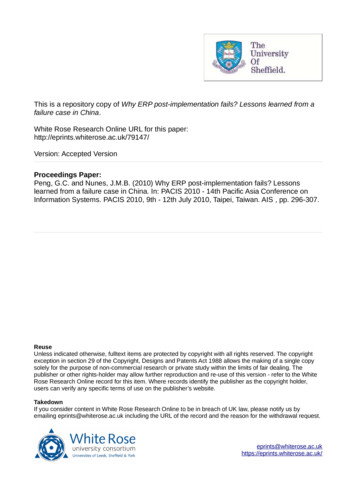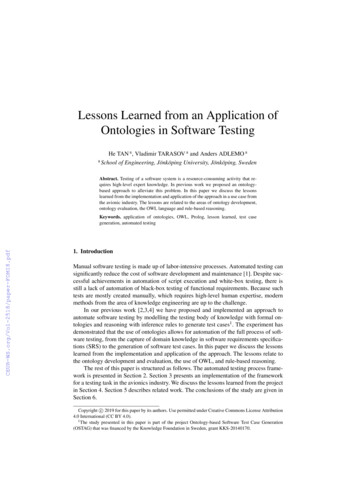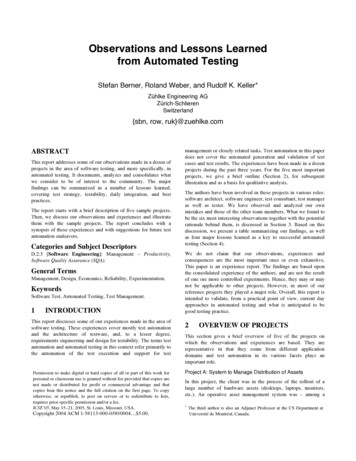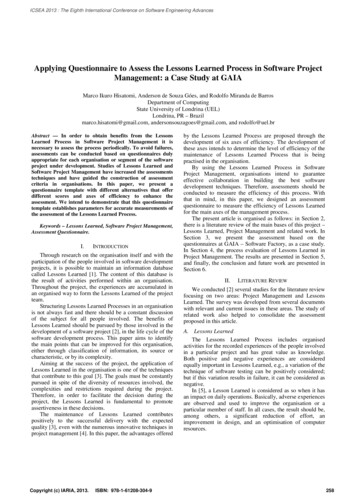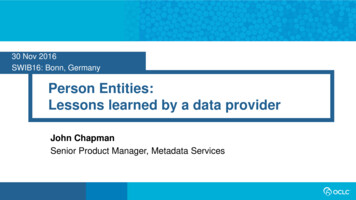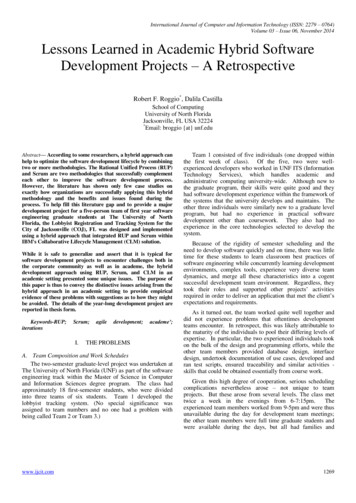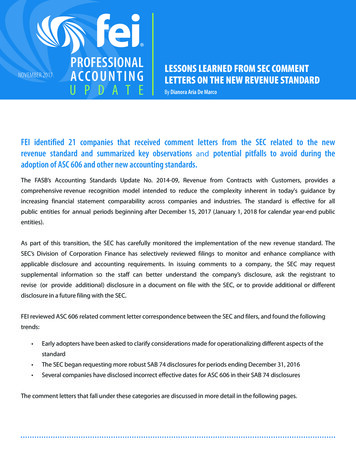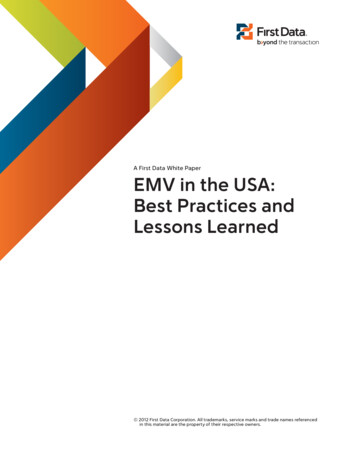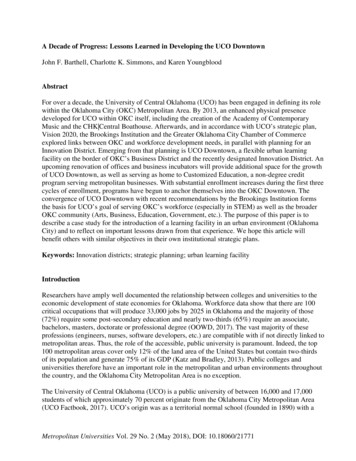
Transcription
XVII International Scientific Conference on Industrial Systems (IS'17)Novi Sad, Serbia, October 4. – 6. 2017.University of Novi Sad, Faculty of Technical Sciences,Department for Industrial Engineering and ManagementAvailable online at http://www.iim.ftn.uns.ac.rs/is17Lessons learned from a partial replication of an experimentin the context of a software engineering courseRobert Ramač(University of Novi Sad, Faculty of Technical Sciences, Trg Dositeja Obradovića 6, Serbia,ramac.robert@uns.ac.rs)Itir Karac(M3S Research Unit, University of Oulu, Finland, Itir.karac@oulu.fi)Burak Turhan(Department of Computer Science, Brunel University London, United Kingdom, burak.turhan@brunel.ac.uk)Natalia Juristo(Escuela Tecnica Superior de Ingenieros Informaticos, Universidad Politecnica de Madrid, Spain,natalia@fi.upm.es)Vladimir Mandić(University of Novi Sad, Faculty of Technical Sciencies, Trg Dositeja Obradovića 6, Serbia,vladman@uns.ac.rs)AbstractReplications are an integral component of experimentation through which the validity and reliability ofthe observed outcome in a previous experiment can be probed. In a strict replication, the experimentis executed in the same conditions as the original by following the same protocol and thus theevidence is strengthened statistically by means of increased sample size. Another objective forrunning replications is generalizing the experimental results beyond the limitations of one study and itscontext. For this purpose, certain elements of the original experiment, such as experimenters,experimental objects, and construct operationalization are altered and their impact is investigated.This paper presents lessons learned from a replication that was conducted as a part of anundergraduate university course in Serbia. The focus of the experiment was investigating theeffectiveness of writing tests during the development process. The original experiment investigated theeffectiveness of test-first programming and was conducted in Italy (Politecnico di Torino) with thirdyear computer science students during an intensive Java course. Lessons learned from this partialreplication are that the given task descriptions and structure has an impact on the experiment outcomeand that variations in metrics collection can occur when multiple researchers analyse the data, whichrequires metrics consolidation.Key words: software testing process, empirical software engineering, controlled experiments, partialreplication, software development process1. INTRODUCTIONToday research in software engineering (SE) isconsidered to be of great importance. Every goodresearch in the field of SE must be based on someevidence, and one of the ways to collect evidence isthrough experimentation. In SE experimentation can bequite difficult, and one reason for that is that there is alarge number of context variables and creating acohesive understanding of experimental results requiresa community of researchers that can replicate studies,vary context variables and build abstract models thatrepresent the common observation about the discipline[3]. Empirical methods in SE are gaining popularity inthe last few years and experimentation is being movedto the centre of the research process [1,2,3]. This isbecause there is a need to somehow validateassumptions or claims and the need to verify ntalism in SE is necessary and that commonwisdom, intuition and speculation are not reliablesources of credible knowledge, thus experimentationcan help build a reliable knowledge base by collectingvarious evidences about the phenomenon underobservation [2,3].Empirical work is complex and time consuming,especially in SE. As Basili et al. say “We can not a prioriassume that the results of any study apply outside thespecific environment in which it was run.” [3]. In otherwords, the uniqueness of the SE research is intricatelytied with the context. Software engineering is specificbecause every new software product is different fromthe last, so these products do not provide a large set ofdata points that would permit sufficient statistical powerfor confirming or rejecting hypothesis [3]. Therefore, theIS'17
Robert Ramač et al.focus of the SE research is always on a process andoften the human factor has the significant effect on thefindings. Another characteristic of SE is that empiricalinvestigators are presented with a challenge to designthe best study that the given context allows and areexpected to generalize the research results, with acertain level of validity [3].In today’s scientific community experiments areconsidered to be an indispensable part of theexperimentation process and scientific process as theyprovide a way to test what effect some variables haveon the variables in observation and as such confirm orrefute some hypothesis that the researchers previouslyset. However, in SE research it is not just aboutidentifying the causal relationships but gaining insightinto the context, variables, various effects and so on[1,2].In order to generate significant and valid resultsresearchers have to use various empirical methods thatshould have a strict design and a precisely definedprocedure to follow. Therefore, it is considered a goodpractice to plan the experimentation process in detail toavoid certain bumps in the road. During the planning ofan experiment it is always helpful to have somereferences in the sense of best practices and problemsthat other researchers faced [1,3,10,14].When it comes to the practitioners there is an ongoingdebate whether if using students as research subjectsis acceptable or not. One of the most commonscenarios in which students are used as researchsubjects is within the context of a university course.There are various viewpoints on this subject and someresearchers are in favour of using students as subjectsin experiments while some are against it [10,11,12,13].Some benefits are: training junior researchers, gainingdata to prove or refute hypothesis, education, industrialrelevance, hands on practical experience and etc.[11,12,13]. On the other hand, the drawbacks areusually tied to validity issues in the context ofexperience, skills and so on [10].Experiments with students as subjects have shown tobe particularly useful for pilot experiments before theyare carried out in the industrial environment [11]. Carveret al. conducted an overview of various benefits andcosts of using students in experiments [11]. Accordingto Carver et al., using students is mainly beneficial toresearchers as it helps with obtaining preliminaryresults, is vital to showing the industry the importance ofresearch, fine tunes the research before it is conductedin some company, helps with training junior researchersetc. [11]. Other studies can neither reject nor accept thehypothesis on the difference between using studentsand industry people in experiments [12]. Höst et al.argue that the only minor differences between studentsand professionals can be shown in their ability toperform small tasks of judgement [13]. With everythingsaid using students as research subjects is somethingthat should be taken into account when conductingresearch in SE, even if there are certain limitations tothis practice.This paper presents lessons learned from a partialreplication of an experiment in the context of a softwaredevelopment course. The replication investigated theeffectiveness of a specific software development andtesting technique. The replication was designed aspractical tasks that the students did within the courseand on which they were graded in order to pass thecourse, i.e. the experiment was embedded within thecourse itself. Various lessons are drawn out of thereplication process itself and from the experience ofworking with students.The rest of the paper is organized as follows.Background about experiments and related terms aregiven in Section 2. In Section 3 a description of thegeneral setup of the replication is provided, whileSection 4 contains the lessons learned from thereplication. Finally, Section 5 is used to give someconclusions about the material presented in this paper.2. BACKGROUND AND RELATED WORKAlthough experiments are considered to be a vital partof SE research [1,2,3], and because of the uniquenessof SE one of the ways to increase the validity ofresearch results is through the process of repeatingexperiments. This process represents a corecomponent of the experimentation process [1]. Theimportance and value of experiment repetitions hasbeen widely recognized in various scientific disciplines,and from a scientific viewpoint not conducting asufficient amount of experiment repetitions can lead tothe acceptance of not robust enough results [2]. In SEexperiment repetitions can have many purposes like:verifying that researchers do not influence the results,that the results are independent of the experiment site,verification that the original experiment results are not aproduct of chance and more [2]. In what follows, basicexperimental terminology and concepts, along withsome related work on using students in SE experimentsare introduced.2.1 TerminologyExperiments can be considered as controlledexperiments when every variable and condition is heldin control by the researchers. In other words, itrepresents a closely monitored and controlled study inwhich an intervention is deliberately introduced in orderto view its effects. The effect of independent variableson the dependant variable is measured during theapplication of treatments on the independent variables[14].Experiment design represents the way an experiment isstructured, and describes how the experiment issupposed to run. The most important parts of theexperiment design are the definition of variables(dependent and independent), and treatment that willbe applied. There are various experiment designs, andthe one used in this paper is the crossover design [15].The crossover experiment design represents anexperiment design in which values for independentIS'17199
Robert Ramač et al.variables are switched. In this way the risk of subjectsbeing biased to variable values is eliminated [15].empirical methodsusefulnessA quasi experiment is considered to be an experimentin which the researcher does not have full control ofevery aspect of the experiment. Often it leads to theinability to obtain a satisfactory sample [14]. Generally,quasi experiments are typical in SE because of theresearcher’s inability to control every factor.Experiment replications are repeated executions of theoriginal experiment. Experiment replications serve toconsolidate knowledge that is built upon someexperimentation results [5]. By running replications ofsome experiment and confirming the results of theoriginal experiment researches are one step closer toinferring that such results are regularities existing in thephenomenon that is under study by the experiment [1].Running more and more replications of one experimentfurther increase the credibility of the results [4]. Thereare many classifications of replications [1,2,3,6,7]. Forexample, there are strict replications that are used inorder to replicate a base experiment as precisely aspossible, differentiated replications that alter theaspects of the original experiment in order to test thelimits of that studies conclusions, partial replicationsthat have the same goal in focus as the originalexperiment but in some way alter the design orprocedure of the experiment etc. [2, 16]. Also, someresearchers strive to conduct as many replications aspossible in one study in order to widen the sample asmuch as possible and by confirming the results try togeneralize them to the whole population that liesbeneath the study [9]. It is common thought in literaturethat more replications whose results are in compliancewith the base experiment results equal more reliableresults about the phenomenon under study.2.2 Experiments with studentsSoftware engineering experiments require subjects toapply treatment, e.g. to apply a software developmenttechnique. In SE research these subjects come in theform of professionals who work for some company orstudents who attend a certain course. This papers mainfocus is on running experiments with students assubjects [10,11,12,13].In literature there are various mentions of this matterand Table 1 shows some of the main characteristics(benefits) with which this paper can relate to.Table 1. Benefits of using students as subjectsRefCharacteristic[11]Obtaining evidenceneeded to confirm orrefute hypotheses[11]Train juniorresearchers[11]Education on moderntopics[11]Industrial relevance[11]Hands-on practice and200DescriptionNew hypothesis need toundergo empirical validationsbefore their use in the industryThe academic environmenttends to be more “soft” forjunior researchers to generatesome experienceUsing the research to trainstudents in some populartechnologies and techniquesStudents gain some insight intovarious industrial problemsStudents gain first hand[13]Mimic professionalsusing students inexperimentsexamples of some real worldproblems instead of justtheoretical classes. Alsostudents are demonstrated theusefulness of using quantitativemethodsMinor differences betweenstudents and professional leadto good test runs of theexperimentBesides the characteristics shown in the table, inliterature, there is mention of some drawbacks to usingstudents as subjects. One of the main drawbacks is thegeneration of validity problems for formal experiments.Some researchers and practitioners claim that the useof students as subjects reduces the practical value ofan experiment because of validity issues such as thelack of experience and skills. In other words, authorsargue that professionals are a more credible source ofdata because of their knowledge base, and that resultsgathered from students might not be suitable forgeneralization. Also there are those that neither sidewith, nor discourage the use of students as researchsubjects, and
Lessons learned from a partial replication of an experiment in the context of a software engineering course. Robert. Ramač (University of Novi Sad, Faculty of Technical Sciences, Trg Dositeja Obradovića 6, Serbia, ramac.robert@uns.ac.rs) Itir. Karac (M3S Research Unit, University of Oulu, Finland, Itir.karac@oulu.fi) Burak. Turhan (Department of Computer Science, Brunel University London .
